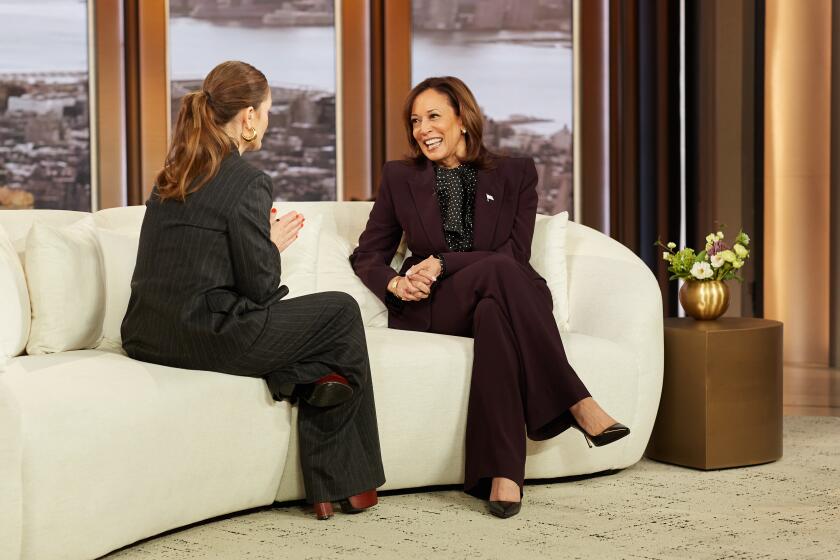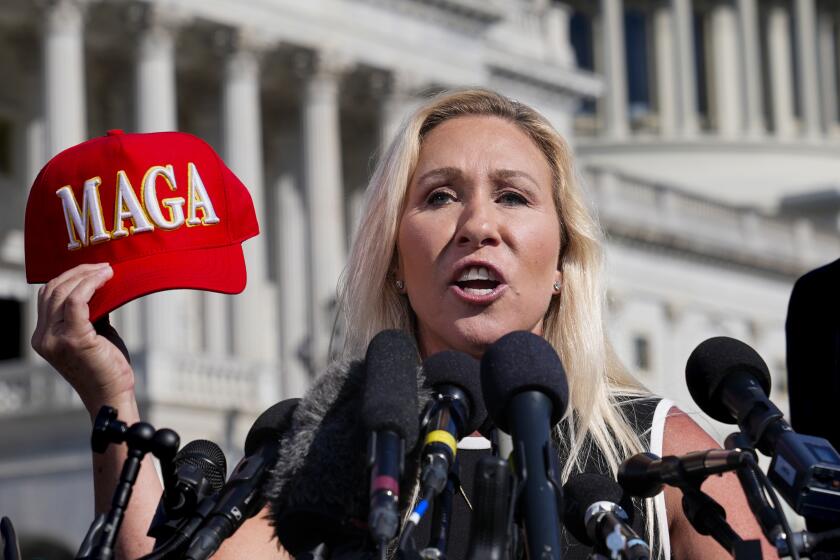Let parents hold the remote
THIS WEEK, Congress will once again consider what to do about the perceived threat to children from television violence.
Unfortunately, some lawmakers seem tempted by the idea of deeper government involvement in what television can show. The Federal Communications Commission, for instance, suggests that Congress should “time channel” certain shows to late-night time slots, implement government-run ratings or compel the segregation of more-violent programs to premium channels.
But speech restrictions such as these would be grave mistakes -- mistakes that courts are unlikely to tolerate. The better approach is for Congress to empower parents -- not government -- to control what TV programs are appropriate for children to watch.
Depictions of violence have long figured importantly in all media. That a program displays violence cannot automatically trump its positive social value. The Old Testament is often violent, as are “Hamlet,” news coverage of war and many of our best television dramas. Depictions of violence and its consequences can contribute powerfully to a show’s portrayal of our often violent world, and violence -- however disquieting -- can add a level of meaning that is achievable in no other way.
Even the staunchest critics of TV violence must concede that only certain depictions cause real concern. But letting government decide which depictions threaten children’s welfare (and therefore should be labeled or otherwise restricted or segregated) is both unconstitutional and unwise. For starters, any definition of impermissibly violent television programming will be so vague that people must “guess at its meaning and differ as to its application” -- a violation of due process, as the Supreme Court held more than 80 years ago. To test just two proposed definitions, is an abusive interrogation of a suspect on “24” patently offensive? Is a depiction of the Normandy landing in a television showing of “Saving Private Ryan” excessive? Who knows?
All vague prohibitions are unconstitutional, but vague regulations of speech are particularly troubling. They “chill” valuable expression as everyone tries to avoid any speech that risks penalty -- even if that speech is not actually illegal. And vague laws give regulators and prosecutors leeway to restrict speech in ways that reflect their own predilections.
EQUALLY DANGEROUS, those who want to regulate televised violence are generally responding less to the violent content itself than to what particular depictions say about using violence. But the 1st Amendment clearly prohibits government regulation based on the viewpoint speech expresses: Congress is forbidden to target speech voicing a “disapproved” message about violence (like a show admiringly portraying a mobster’s violent rise through the ranks) while exempting “approved” speech on the same subject (like a show condemning a drug dealer’s mayhem).
It’s tempting to relax these standards when government restricts speech for children’s sake, but that turns the 1st Amendment upside down. If anything, children’s impressionable nature cuts against government dictating what they see or learn. Why else fight about teaching evolution?
Time channeling prevents parents and children alike from watching televised violence except during specified times, thus unconstitutionally requiring adults to view only programming “suitable” for youngsters. Likewise, compelling cable TV operators to offer more violent networks on an “a la carte” basis would also violate the 1st Amendment. Finally, even assuming the worst about how television violence affects young children, the interests Congress is trying to serve are too at odds with one another to meet the high court’s standards. Our interest in protecting children from frightening material, for example, would suggest that depictions of violence should be cartoonish and sanitized -- but that would undercut the asserted interest in making children understand the consequences of violence and avoiding material that some fear children might imitate. And even the strongest proponents of government control would likely tolerate violence on news and sports programs, even though that seems at least as likely to cause the very effects the proponents seek to prevent.
As a father and grandfather, I share the worries of other parents about what their children watch on TV. But it is in my role as a parent and grandparent -- not just a scholar -- that I write here.
We should resist moves by government to control the upbringing of our children. The Supreme Court has repeatedly recognized that more narrowly tailored measures, intended solely to facilitate parental control, are less restrictive of speech and should be invoked even when centralized government regulation might be more effective.
Fortunately, parents today have more options than ever to control what their children see on television, from the V-chip to time-shifting technologies to voluntary ratings systems. We should not bypass them on the easy but treacherous path to censorship.
More to Read
Get the L.A. Times Politics newsletter
Deeply reported insights into legislation, politics and policy from Sacramento, Washington and beyond. In your inbox three times per week.
You may occasionally receive promotional content from the Los Angeles Times.






